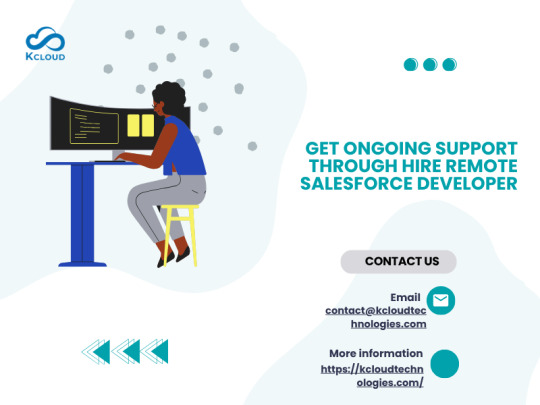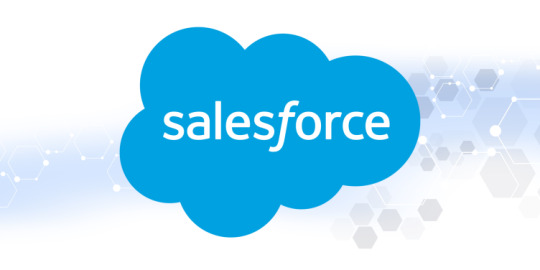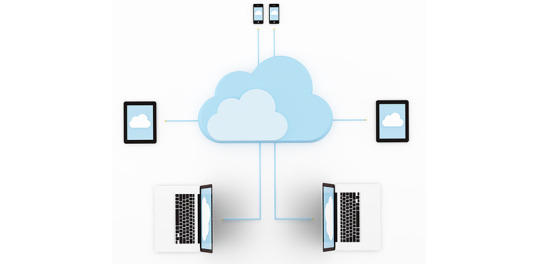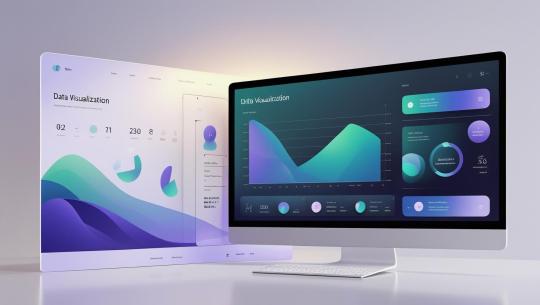#Remote Salesforce Developers
Explore tagged Tumblr posts
Text
Hire Remote Salesforce Developers
Salesforce is the world's leading customer relationship management (CRM) platform, used by more than 125,000 companies across various industries. Salesforce helps businesses manage their sales, marketing, customer service, analytics, and more, all in one cloud-based system.
#Hire Remote Salesforce Developers#Best Hire Remote Salesforce Developers#Remote Salesforce Developers
0 notes
Text
How Salesforce Developers Shape the Future of Project Management Success?
The ever-changing field of project management has made technology developments crucial to the achievement of desired results. With the help of knowledgeable developers and consultants, Salesforce is a platform that can truly alter businesses, even in the face of an extensive number of competing offerings.
A Salesforce consultant will have a huge influence on how project managers succeed in the future. They will use Salesforce's features to improve teamwork, accelerate efficiency, and streamline procedures.
In this blog, we'll reveal the critical role that Salesforce developers play in influencing the success of project management. We'll explore their experience streamlining processes, streamlining work, and customizing solutions to drive productivity and cooperation in the fast-paced project environments of today.
Customized Solutions Crafting
Explore the ways in which developers modify modules, improve user experience, and guarantee scalability to ensure future-proofing of Salesforce systems.
Adapting Salesforce Modules:
The modules in Salesforce's suite are easily navigated by developers, who may easily customize features to fit project workflows. Whether creating complex workflows, setting unique items, or connecting third-party apps, developers take use of Salesforce's adaptability to create solutions that align with project goals.
User Experience Enhancement:
Developers may simply explore the modules in Salesforce's suite and modify functionalities to suit project procedures. Whether establishing custom items, integrating third-party apps, or building intricate workflows, developers leverage Salesforce's flexibility to build solutions that support project objectives
Scalability and Future-Proofing:
Future-focused, scalable, and flexible solutions are designed by developers. They future-proof project management systems by foreseeing possible expansion and changing needs, providing the groundwork for long-term success and adaptability.

Seamless Collaboration Integration
Examine how seamless collaboration integration may strengthen teamwork, bridge systems, and enable data-driven decision-making.
System Integration:
By utilizing middleware and APIs, developers can plan the smooth connection of Salesforce with other vital programs and systems. Integration facilitates data flow and guarantees a cohesive environment through connections with project management software, communication tools, and enterprise resource planning (ERP) systems.
Collaborative Workspace:
Within Salesforce, developers create collaborative workspaces that enable teams to share insights, interact in real time, and centralize communication. Transparent communication and knowledge sharing are facilitated by features like Chatter, Communities, and interfaces with Slack and other collaborative applications.
Data-Driven Decision Synthesis:
Developers facilitate the extraction of meaningful insights from heterogeneous data sources for project stakeholders by providing integrated analytics and reporting functionalities. Through the synthesis of data in Salesforce, ranging from project status to customer feedback, stakeholders can efficiently minimize risks, make well-informed decisions, and drive strategic objectives.
Automation for Enhanced Efficiency
Investigating data synthesis, collaborative workspaces, and efficient procedures for well-informed decision-making.
Workflow Automation:
Developers use Salesforce's automation features, such Flow and Process Builder, to standardize procedures and automate time-consuming tasks. They manage workflows that reduce human error, speed up task completion, and increase overall efficiency by specifying triggers, actions, and approval processes.
AI-Powered Insights:
By using artificial intelligence (AI) tools such as Salesforce Einstein, developers are able to introduce intelligence into project management procedures. AI-driven insights enable project teams to make data-driven decisions quickly, from sentiment analysis that measures stakeholder satisfaction to predictive analytics that predicts project timeframes.

Mobile Optimization:
Salesforce is optimized for mobile devices by developers who understand how important mobility is in today's dynamic work environment. They ensure that project stakeholders can access vital information and complete activities while on the go by utilizing native app development and responsive design, which promotes responsiveness and productivity.
Conclusion
In conclusion, Salesforce developers are the engine of innovation, using the platform's potential to entirely rethink the project management sector in conjunction with Salesforce consulting experience. By means of customization, automation, and integration, they facilitate enterprises in achieving unparalleled levels of efficiency, collaboration, and success. The combined experience of consultants and Salesforce developers will be essential in steering project management's future course toward even higher success and quality as it develops.
FAQs About Salesforce Developers and Project Management
How do Salesforce developers contribute to project management success?
Salesforce developers streamline project workflows, automate tasks, and customize solutions, enhancing efficiency and collaboration for project teams.
What skills do Salesforce developers bring to project management?
Salesforce developers possess expertise in coding, data management, and platform customization, enabling them to tailor solutions that align with project goals and requirements.
Why is Salesforce considered crucial for future project management?
Salesforce's robust platform offers scalable solutions, real-time insights, and seamless integration capabilities, empowering project managers to drive innovation and achieve project success efficient
#remote work#technology#hire salesforce developer#hire salesforce consultant#project manager#tech jobs#Future of businesses
4 notes
·
View notes
Text

Hiring a remote Salesforce developer ensures you receive ongoing support to keep your CRM environment running smoothly and efficiently. These experts offer continuous monitoring, timely troubleshooting, and proactive enhancements tailored to your business needs. With flexible availability and a global talent pool, remote developers provide cost-effective support without compromising quality. They provide regular updates, bug fixes, and system optimizations to ensure optimal performance. Whether it's customizing features, integrating third-party apps, or maintaining data integrity, remote Salesforce developers deliver consistent, reliable support. With Hire Remote Salesforce Developers, This ongoing partnership helps businesses stay agile, scalable, and aligned with evolving customer and market demands.
0 notes
Text
Hire Salesforce Developers - Starting from $15/hour
Hire smarter with HireDeveloper.Dev, your gateway to the top 3.5% talents in Salesforce development. Whether you're scaling or optimizing your CRM, you can hire in 48 hours and keep costs in check. Fast-track your growth with developers who get it right the first time. Hire Now, Visit: https://hiredeveloper.dev/hire-expert-salesforce-developers
#hire developer#hire remote developer#hire dedicated developer#find a developer#hire salesforce developers#salesforce certified developers
0 notes
Text
How Salesforce Supports Remote and Hybrid Work Environments: Insights from Salesforce Consultants in New York

In recent years, the traditional 9-to-5 office setup has evolved dramatically. Remote and hybrid work environments are no longer temporary solutions—they're now fundamental to how modern businesses operate. From global corporations to local firms in bustling hubs like New York, organizations are increasingly relying on digital platforms to stay connected, productive, and agile.
Among these platforms, Salesforce has emerged as a standout solution. With its cloud-based infrastructure, real-time collaboration tools, and powerful automation features, Salesforce enables businesses to thrive regardless of where their employees are located. This blog explores how Salesforce supports remote and hybrid work and why partnering with a Salesforce consultant in New York can make all the difference.
🚀 The Shift to Remote and Hybrid Work
The global pandemic forced businesses to quickly adopt remote work. While the initial transition was reactive, many companies have since embraced hybrid work models as a long-term strategy. This shift requires tools that support seamless communication, real-time access to data, secure collaboration, and process automation.
Enter Salesforce—a robust, scalable CRM and business operations platform that's tailor-made for decentralized teams. Whether you're a startup or an enterprise in New York City, Salesforce can provide the infrastructure needed to keep your team connected and productive across locations.
🌐 Cloud-Based Accessibility for a Distributed Workforce
One of the greatest strengths of Salesforce is that it’s built in the cloud. That means no on-premise servers, no physical limitations, and 24/7 access from anywhere with an internet connection.
For Sales Teams: Reps can access lead data, update opportunities, and close deals from their mobile devices.
For Customer Support: Agents can resolve cases remotely with all necessary information at their fingertips.
For Management: Executives and managers can view performance dashboards, run reports, and make data-driven decisions from any location.
For companies working with a Salesforce consulting partner in New York, these capabilities can be enhanced through tailored configurations and custom workflows designed for remote operations.
💬 Real-Time Collaboration with Slack Integration
The acquisition of Slack by Salesforce has revolutionized how remote and hybrid teams collaborate. With Slack integrated into the Salesforce ecosystem:
Teams can instantly communicate across departments.
Channels can be connected directly to Salesforce records and customer cases.
Alerts and updates from Salesforce can be pushed to Slack in real time.
By streamlining communication, this integration minimizes back-and-forth emails and ensures everyone stays on the same page—even when they’re not in the same building.
Salesforce consultants in New York have been instrumental in helping companies implement and optimize Slack for hybrid collaboration, creating automated workflows and integrations that improve daily operations.
⚙️ Automating Workflows to Boost Remote Productivity
When employees work from different locations, consistency becomes crucial. Salesforce’s automation tools—especially Salesforce Flow—ensure that business processes run smoothly without manual intervention.
Lead nurturing, case assignment, approval processes, and follow-up reminders can all be automated.
Automated notifications ensure that no task falls through the cracks, even across time zones.
Workflows can be triggered by user actions, system events, or scheduled intervals.
By working with a skilled Salesforce developer in New York, companies can build powerful automation workflows that reduce human error, save time, and allow teams to focus on higher-value tasks.
📊 Advanced Reporting and Dashboards
Managers overseeing remote and hybrid teams need visibility into operations without micromanaging. Salesforce offers powerful analytics tools that provide:
Real-time dashboards tailored to different departments.
Custom reports tracking KPIs, user activity, and performance metrics.
AI-powered insights to help predict trends and identify bottlenecks.
With these tools, leaders can maintain transparency and accountability across a distributed workforce.
A Salesforce consulting firm in New York can help customize these analytics tools to align with your business objectives and reporting needs.
🧩 Integration with Other Business Tools
Salesforce acts as the central nervous system of many remote organizations. Through its vast integration capabilities, Salesforce can be connected to:
Email & Calendar Tools: Gmail, Outlook, Office 365
Project Management Platforms: Trello, Asana, Jira
ERP & Accounting Software: QuickBooks, NetSuite, SAP
Marketing Platforms: HubSpot, Mailchimp, Marketo
By consolidating data and workflows into a unified platform, Salesforce eliminates silos and enhances operational efficiency. A certified Salesforce consultant in New York can assess your current tech stack and recommend optimal integration strategies.
🛡️ Security and Compliance for Remote Access
Security is a top concern for remote and hybrid environments. Salesforce offers enterprise-grade security features such as:
Multi-Factor Authentication (MFA)
Role-based access control
Field-level security
Data encryption at rest and in transit
With frequent security audits and compliance with major standards (like GDPR and HIPAA), Salesforce ensures your data is safe—even when accessed from home offices or mobile devices.
Salesforce consulting partners in New York often specialize in security audits and compliance configuration, making them invaluable for regulated industries like finance and healthcare.
🧠 Learning and Adoption Support
Remote work means employees need to be self-sufficient. Salesforce provides:
In-app training and guidance (with tools like myTrailhead)
Mobile-friendly user interfaces
Custom help content and knowledge bases
To ensure adoption, Salesforce consultants in New York provide onboarding, user training, and ongoing support tailored to your team’s needs. They can even build custom Lightning apps that match the workflows your employees are already familiar with.
🏙️ Why New York Businesses Choose Local Salesforce Experts
New York’s dynamic business landscape demands rapid adaptation and innovation. Working with a Salesforce consultant in New York provides:
Local market understanding: Knowledge of regional regulations, customer behavior, and competitive landscape.
Real-time support: Same time zone assistance for urgent issues and strategic guidance.
Scalability: Local consultants understand how to scale Salesforce as your team grows or shifts its hybrid work model.
Whether you're a fintech startup in Manhattan, a nonprofit in Brooklyn, or a healthcare provider in the Bronx, partnering with a Salesforce consulting firm in New York means access to personalized service and technical excellence.
✅ Conclusion
The workplace has changed—and Salesforce has changed with it. Whether your team is fully remote, hybrid, or in transition, Salesforce offers the tools needed to collaborate, automate, and grow in any environment.
From cloud accessibility and Slack integration to automation and advanced analytics, Salesforce provides the foundation for productive and secure hybrid operations. But the real key to success lies in implementation. By working with experienced Salesforce consultants in New York, businesses can ensure they’re not just using Salesforce, but truly leveraging it.
So if you're ready to empower your remote workforce and future-proof your business operations, consider connecting with a trusted Salesforce consulting partner in New York. The future of work is here—and Salesforce is ready to lead the way.
#salesforce consultant in new york#salesforce consulting in new york#salesforce consulting partner in new york#salesforce consultants in new york#salesforce developer in new york#How Salesforce Supports Remote and Hybrid Work Environments: Insights from Salesforce Consultants in New York
1 note
·
View note
Text

6 Reasons You Should Hire a Remote Salesforce Developer
Transform Your Business with Tailored Salesforce Solutions – Get Started Now!
0 notes
Text
How to Hire a Salesforce Developer: A Step-by-Step Guide

One of the most effective CRM systems is Salesforce, which helps companies increase revenue, automate processes, and streamline client interactions. Hiring the appropriate developer is essential to success, whether you're establishing integrations or customizing Salesforce for your business.
If you need to hire Salesforce experts, finding the ideal candidate requires a structured hiring procedure. A proficient Salesforce developer can improve productivity and scalability for your product company, where automation and data-driven choices are essential. To help you hire the best, this article will serve as a step-by-step guide.
A Step-by-Step Process to Find the Right Salesforce Developer for Your Business Needs
Step 1: Define Your Requirements
List the qualities you are looking for in a Salesforce developer before you begin the hiring process:
Do you require assistance with administration or custom development?
Will they manage third-party tools, automation, or API integrations?
Do you require a contract specialist or a full-time hire?
Clearly defining these criteria will assist you in efficiently selecting applicants.
Step 2: Choose Between In-House or Remote Hiring
Choose if you want to hire a remote developer or if you need an on-site developer. For SaaS organizations with global operations, remote developers provide flexibility and access to a larger talent pool.
Step 3: Look for Essential Skills
A proficient Salesforce developer ought to possess:
Proficiency with the components of Apex, Visualforce, and Lightning.
Strong knowledge of integrating Salesforce APIs.
Familiarity with data security, automation, and custom workflows.
Familiarity with the architecture and best practices of Salesforce.
Step 4: Where to Find the Right Talent
To hire Salesforce developers, explore these platforms:
Uplers - the largest hiring platform with a 1.5M+ talent network serving the top 3.5% product and engineering talent.
Freelance Websites – Upwork, Toptal, and Freelancer.
Job Portals – LinkedIn, Indeed, and Glassdoor.
IT Staffing Agencies
Step 5: Conduct Technical Assessments
Examine applicants using:
Coding tests: Assess their proficiency with Lightning and Apex development.
Problem-solving exercises: Evaluate their aptitude for resolving Salesforce-related problems.
Examine previous work and client testimonials in your portfolio.
Summing Up
Better automation, enhanced business processes, and seamless CRM customization are guaranteed when you hire skilled Salesforce developers. Focussing on abilities, expertise, and project requirements will help you make the right decision, whether you need an in-house specialist or need to engage a remote developer.
Investing in a qualified Salesforce specialist benefits SaaS organizations by improving customer relationship management and fostering business expansion.
0 notes
Text
Hire Best Remote Salesforce Developers
Imagine a CRM that is more than just a data repository—rather, a multifaceted beast capable of task automation, customer experience personalization and departmental sales growth. You know as a tech leader that the power of a fully optimized Salesforce is the key to unlocking explosive growth. The problem lies in the fact that your present workforce is overworked and that traditional hiring is a talent-starved, lengthy process. Plus, it’s more costly for many enterprises and startups running on a tight budget. This is where Muoro gets all the attention.
#Hire Best Remote Salesforce Developers#Hire Remote Salesforce Developers#Hire Salesforce Developers
0 notes
Text
#salesforce developer certification roadmap#Salesforce certification path#salesforce architect certification path#salesforce integration architect certification#salesforce integration architect exam questions#how to get salesforce admin certification#remote salesforce developer jobs
0 notes
Text
Remote Salesforce Development: Best Practices for Hiring and Managing Remote Salesforce Developers

Introduction
The tech industry landscape is rapidly transforming with the rise of remote work, a trend that has become particularly prominent in niche sectors like Salesforce development. This shift presents unique challenges and opportunities in the realms of hiring and managing remote professionals. Organizations looking to leverage the benefits of remote Salesforce teams must adopt effective strategies tailored to this new work paradigm. This article delves into the best practices for hiring, onboarding, and managing remote Salesforce developers, highlighting the importance of these processes in the success of remote teams.
I. The Hiring Process
Identifying the Right Talent
The quest for the ideal Salesforce developer begins with a clear understanding of the required skills and experience. Look beyond basic programming knowledge; proficiency in Salesforce’s suite of tools, experience with customizing CRM solutions, and familiarity with cloud-based technologies are equally important. Platforms like LinkedIn, Upwork, and Salesforce communities offer a rich pool of global talent. Networking in industry events, both virtual and physical, can also uncover potential candidates.
Evaluating Candidates
Evaluating candidates remotely requires a blend of technical and interpersonal assessments. Technical evaluations should include practical coding tests and problem-solving scenarios specific to Salesforce. During remote interviews, focus on communication skills and cultural fit. How a candidate interacts in a remote setting gives insight into their potential as a team member. It is crucial to identify the right candidate based on their skills, your business requirements, and their ability to match those particular requirements.
Leveraging Salesforce Certifications
Salesforce certifications are vital indicators of a candidate’s expertise and commitment to professional development. Understanding the various levels of Salesforce certifications—from Certified Administrator to Certified Technical Architect—helps identify candidates who meet your projects’ specific needs.
II. Effective Onboarding Strategies
Creating a Welcoming Remote Environment
A structured onboarding process is vital for integrating remote employees. Use digital tools like video introductions, virtual tours of the company, and digital handbooks to familiarize new hires with the company culture and processes. They will only be able to deliver the best results if they get all their required information and help during the onboarding.
Resources
Ensure new hires have access to necessary company materials, processes, and such. It helps to have a buddy in each department for the Salesforce developer to get department-specific feedback while building tools for them.
Setting Clear Expectations
Clearly communicate roles, responsibilities, and project goals from the start. Establishing clear expectations helps remote Salesforce developers understand their contribution and align their efforts with the company’s objectives. They also need to be given a background of their assigned project so they know how they are supposed to participate and all that has already been taken care of.
III. Managing Remote Salesforce Developers
Communication Best Practices
Frequent communication is key in a remote setting. Establish regular check-ins and encourage open dialogue. All stakeholders need to be kept updated on the Salesforce development process, so consistent communication is key. Apart from general updates, getting feedback from them is helpful to learn how the company adapts to the new processes and tools.
Project Management Tools and Techniques
Effective project management in remote teams requires robust tools and methodologies. Adopting Agile methodologies can enhance flexibility and collaboration, adapting well to the remote work environment. It also helps to work in sprints with a constant feedback cycle to improve iteratively.
Building Collaboratively
A tool that is to be deployed company-wide needs to be built with the cooperation and collaboration of the entire organization. Ensure the remote Salesforce developer has access to each department’s workflow and the company’s overall workflow so they can build a solution that benefits all stakeholders. The department also needs to be trained on each module built to encourage a seamless company-wide adoption of the new Salesforce tools.
Monitoring and Feedback
Monitor the development process and build an internal team of adoption testing to see any feedback that can come with the actual use of the tool. With this feedback, you can work on all the kinks in the tool, as well as processes and adoption. The internal testing committee can be made of a member of each department so that all are covered, and no particular workflow is neglected.
IV. Overcoming Challenges in Remote Salesforce Development
Dealing with Time Zone Differences
Managing time zone differences is crucial for maintaining efficiency. Implement flexible working hours and plan meetings during overlapping work times to ensure effective collaboration. Certain remote Salesforce developers also provide time zone-free working hours so you can hire them to work in your time zone as best as possible. You can set the work day exactly as your company’s or even simply have a few overlapping hours for real-time communication and updates.
Ensuring Security and Compliance
In a remote setting, maintaining data security and compliance is paramount. Implement strong security protocols, including VPNs, secure logins, and adherence to data protection laws.
V. Case Studies/Success Stories
Incorporate case studies or success stories from companies that have successfully navigated the challenges of remote Salesforce development. These examples provide practical insights and demonstrate the effectiveness of the strategies discussed.
Conclusion
Adopting these best practices in hiring, onboarding, and managing remote Salesforce developers is essential for the success of remote teams. This approach not only addresses the unique challenges of remote work but also harnesses its full potential. With CRMJetty’s experience of over 16 years as a company and with our Salesforce developers who have experience working in the remote setting, you can rest assured that your project will be taken care of in the best possible way.
Please reach out to us for all your Salesforce development needs, and we can discuss your requirements to help you with the best solutions.
Original Blog: https://www.crmjetty.com/blog/remote-salesforce-development-best-practices-hiring-managing-remote-salesforce-developers/
0 notes
Text
Salesforce's Predictions & Trends for the Future of Technology in 2023

Change is the only constant in technology, as it is in life. In this article, you'll hear predictions from Salesforce leaders about how technology will shape the future, such as:
Businesses should keep technology predictions in mind in the future.
The future of sales, service, and marketing
What technologies will be disruptive in the future?
How will businesses lead with values in the future?
What exactly is Salesforce (and why are its executives making predictions about the future)?
Salesforce is the global leader in customer relationship management (CRM), assisting businesses in connecting with customers in new ways. Salesforce helps businesses of all sizes and industries digitally transform around their customers by leveraging the power of automation, artificial intelligence, and real-time data to make every customer experience more personal, valuable, and memorable.
Salesforce executives are at the forefront of the latest business trends, technologies, and challenges. They bring expertise and insight from market analysis, customer conversations, and other sources to help reveal what the future may bring.
Five Technology Predictions for Businesses in 2023
While a recession is not a foregone conclusion, 74% of CEOs believe the economy will deteriorate in the near term. Digital transformation is critical for businesses to navigate the growing economic turbulence they are facing today. Here are five IT investment predictions for 2023.
1. Organizations that continue to invest in digital transformation will outperform those that do not.
"In times of severe economic headwinds, the pressure to deliver cost savings through increased efficiency and productivity is insurmountable. However, evidence from McKinsey and Bain for the economic downturns of 2008-2009 and 2020 suggests that only seeking efficiency savings during difficult economic conditions is risky: roughly one in ten companies manages to outperform its peers both during downturns and in the subsequent recovery.
The big challenge for 2023 will be to avoid leaning too far toward cost savings and efficiencies and thus risk losing out on the next economic upswing. The calculation of how much of the digital transformation projects can be cut without increasing the risk will be similar. Uber, WhatsApp, AirBNB, Instagram, and Amazon's significant resurgence were all products of the Great Recession. You might experience disruption if you lose focus. — Ed Thompson, SVP, Global Influencer Strategy, Salesforce
2. Automation investment will skyrocket as businesses strive to do more with less.
"In 2023, we'll likely see a spike in automation spending. Everyone wants to automate their work, but we're in an economic climate where businesses must prioritise cost efficiency. Automation is about developing methods of working that save time while driving efficient growth and simply doing more with less." — Brent Hayward, MuleSoft CEO
3. Introducing business intimacy will add value to the organization and elevate the CIO's seat at the table.
"By bringing a new set of skills and operating processes to the executive table during a radically different business environment, CIOs can increase their relevance and capacity to deliver business value. This begins with a thorough understanding of the broader business needs — what the priorities, pain points, processes, investments, and, most importantly, technologies their colleagues are dealing with. This is known as business intimacy, and it is critical for better understanding the strategic priorities of business partners in sales, service, marketing, commerce, information technology, human resources, finance, and other departments." - Juan Perez, Salesforce CIO & EVP
4. To remain competitive, "digital Darwinism" will be required.
"Some companies will cut costs and batten down the hatches. Markets, on the other hand, will continue to evolve. Customers will keep shopping, making decisions, learning and practising new behaviours, and gaining new digital competencies. In this market, competition becomes a matter of 'digital Darwinism.' Businesses must adapt to the rate at which technology influences how society and technology evolve in order to survive and thrive. And to do so, businesses must be bolder and wiser than their competitors. Smart businesses will reallocate resources today to build the business of the future. Forward-thinking executives will issue RFPs seeking vendor collaboration and solutions that go beyond immediate technological requirements or basic automation. To compete, they will strive to create customer-centered solutions that eliminate friction and effort while imitating best-in-class experiences." — Brian Solis, Salesforce's VP of Global Innovation Evangelist
“To survive and thrive, businesses must adapt to the pace at which technology influences how society and technology evolves. And to do this, businesses need to be bolder and wiser than their peers. Smart companies will reallocate resources to build the business of the future, today.
BRIAN SOLIS, VP, GLOBAL INNOVATION EVANGELIST, SALESFORCE
5. Composability will promote business agility and innovation -
"Resources are still scarce despite the rising demand on IT teams, so organizations will need to find ways to make the most of what they already have. In 2023, there will be a renewed emphasis on developing reusable business capabilities to drive efficiency, agility, and optionality at scale." — Matt McLarty, Global CTO, MuleSoft's
Five Sales and Service Predictions for the Future
According to a new Salesforce report, 82% of sales reps have had to quickly adapt to new ways of selling due to changing social and economic conditions. Here are five Salesforce executives' predictions for sales and service success in 2023.
1. Companies that invest in team selling will increase revenue while also empowering individual representatives.
“2023 will bring a period of ‘Great Retraining’ among sales professionals. Sales teams are an organization's backbone, and the pressure is on to keep revenue flowing regardless of the macroeconomic climate."
“The most successful organizations will be the ones that invest in their sales teams, especially when times are uncertain and budgets are tight.
KETAN KARKHANIS, EVP & GM, SALES CLOUD, SALESFORCE
"To accomplish this, we can expect leaders to rely on sales enablement programmers to ensure they are caring for the reps who are on the frontlines of a difficult selling environment, while also empowering them with AI and automation to drive productivity and efficiency throughout their day-to-day." — Ketan Karkhanis, EVP & GM, Sales Cloud, Salesforce
2. Companies that priorities sales enablement will generate more revenue.
"The big move for 2023 will be linking sales training with business outcomes, like an increase in pipeline generation or higher revenue.". Historically, there was no easy way to determine whether time spent on learning and training influenced business outcomes. That's why [Salesforce] developed the world's first accountability performance matrix, allowing us to establish a direct link between sales training and our KPIs. We must hold ourselves accountable as Enablers [of sales] for moving the needle on pipeline generation, revenue, and participation. The better the sales team is prepared, the better they can serve as trusted advisors to customers." – Jody Kohner, EVP, Global Sales Enablement, Salesforce
3. Automation will transform the customer experience and boost revenue.
"Starting in 2023, service organizations will start to view service automation capabilities as a "must have" rather than a "nice to have. Automation was once thought of as a supplement to service solutions. With rising customer expectations, shrinking team sizes, and uncertain economic conditions, automation is at the top of every service leader's priority list for improving the customer experience while lowering the cost to serve."– Clara Shih, CEO of Service Cloud, Salesforce
4. Outstanding customer service will be intuitive, effective, and consistent.
"True success does not come from the initial marketing and sales effort, but rather, growing the relationship with a customer for the long term. We say that customer expectations have never been higher, but in my opinion, they haven't — customers have always wanted to be known and treated fairly and consistently. What's new is the difficulty of consistently engaging customers now that communication can take place through any of a dozen channels. The message to customer experience leaders is to learn to actively listen to customers and design processes that naturally draw customers to a specific channel — one that feels it is their choice. Get this correct and you earn the right to customers for life.” — Michael Maoz, SVP, Innovation Strategy, Salesforce
5. This year, the CDP industry will be one of the fastest growing enterprise markets.
"More than half of customers expect personalization in every interaction, and businesses can deliver it at scale by utilizing a customer data platform" (CDP). Salesforce Genie Customer Data Cloud is a game changer in this regard. As we approach 2023, I believe this technology will become increasingly important. Genie broadens the definition of CDP to power real-time experiences across all Customer 360 channels. This is what our customers want now, because their customers expect ‘magical,' automated, intelligent, and personalized experiences." — David Schmaier, President and Chief Product Officer, Salesforce
“I predict this technology will grow exponentially in importance as we head into 2023. Genie broadens the definition of CDP to power real-time experiences for all channels across the Customer 360.
DAVID SCHMAIER, PRESIDENT AND CHIEF PRODUCT OFFICER, SALESFORCE
Four Disruptive Technology Predictions That Will Shape the Future
Statista named AI/Machine Learning the most impactful disruptive technology in 2021. Salesforce executives discuss five disruptive trends and technologies that will shape the future in 2023.
1. Generative AI will enable mass experience customization.
Machine learning algorithms are used in "generative AI," which enables computers to use existing content (such as text, audio and video files, images, and code) to create new, potentially creative content. In 2023, generative AI will rapidly become an important tool for businesses and ad agencies looking to implement mass customization of experiences —Individuals with the highest customer lifetime value are increasingly seeing machine-generated images and copy that are personalized to their specific profile." — Mick Costigan, VP of Salesforce Futures, Salesforce
2. Employees will have the opportunity to experience workplace culture — in the cloud.
"Executives will finally realize that building connection and company culture doesn't just happen 'in real life,' but thrives online — on platforms like Slack. Data show that investing in collaboration tools and techniques pays off, with digital leaders outperforming digital laggards across the board. According to the Future Forum's Pulse survey, leaders have 59% higher productivity than laggards. Many executives are surprised to learn that leaders have a 2.2x higher sense of belonging to their team than laggards." – Brian Elliott, SVP, Future Forum, Slack
“The data shows investing in collaboration tools and techniques pays off, with digital leaders outpacing digital laggards on every dimension.
BRIAN ELLIOTT, SVP, FUTURE FORUM, SLACK
3. Everyone will have greater access to and understanding of data.
"More people will understand data as data literacy for the typical employee improves. Data will become more natural and approachable, transforming it from something for the few to something for the many. — all infused in the flow of work.” — Francois Ajenstat, Chief Product Officer, Tableau
4. We will not be working in virtual reality offices.
"While manufacturers of 'professional' versions of VR headsets appear to believe that we will be interacting with each other's avatars in virtual reality offices in the future — I think not. The technology is still too crude, the avatars are uninteresting, and people wearing VR headsets appear ridiculous. With the exception of gaming, nearly all of the billions currently being invested in VR are likely to be a total loss." — Peter Schwartz, SVP Chief Futures Officer, Salesforce
Three Forecasts for How Businesses Will Prioritize Values in the Future
Eighty-eight percent of customers expect companies to clearly state their values, but only half do. Here are three predictions for how businesses will live up to their values in the future and beyond.
1. Businesses will prioritize climate commitments — despite economic uncertainty
"Climate change will not wait - even in times of economic uncertainty. Corporate leaders must continue to make progress toward their sustainability commitments in 2023 and beyond to ensure the long-term success of both their organizations and the planet. Salesforce technology can help customers improve their business's efficiency and profitability while also advancing their environmental, social, and governance (ESG) goals for success right now." — Suzanne DiBianca, EVP and Chief Impact Officer, Salesforce
“Climate change won’t wait – even in times of economic uncertainty. In 2023 and beyond, corporate leaders must continue making progress towards their sustainability commitments, ensuring the long-term success of both their organizations and the planet.
SUZANNE DIBIANCA, EVP AND CHIEF IMPACT OFFICER, SALESFORCE
2. Businesses will approach consumer data with trust at the forefront of their minds.
Consumer data may be the next virtual currency, but it's also the next regulated currency because by 2026, privacy laws are expected to apply to 75% of the world's population. Major global data privacy regulations are expected to be implemented over the next three years, and failure to navigate them will have major effects for growth and reputation." — Wendy Batchelder, SVP & Chief Data Officer of Trust, Salesforce
3. Regulation will assist businesses in better understanding and implementing tech ethics.
"Discussions in the United States regarding a national privacy bill, as well as the development of AI regulation in Europe, are encouraging. While there are still crucial parts to iron out, establishing a set of guidelines that everyone can adhere to will make acting responsibly in technology much easier. We want to enable the future of AI and innovation while also protecting those who will be affected by it - and regulation can help us do that." — Paula Goldman, Chief Ethical and Humane Use Officer, Salesforce
0 notes
Text
Hire Remote Salesforce Developers
Looking to enhance your Salesforce team? Hire remote Salesforce developers at Muoro. Expert professionals ready to boost your CRM capabilities. Flexible, reliable, and skilled developers just a click away. Transform your business with our top-tier Salesforce talent. Hire remote Salesforce developers today!

#Hire Remote Salesforce Developers#Best Hire Remote Salesforce Developers#Remote Salesforce Developers
0 notes
Text
Summer 2025 Game Development Student Internship Roundup, Part 1
Internship recruiting season has begun for some large game publishers and developers. This means that a number of internship opportunities for summer 2025 have been posted and will be collecting applicants. Internships are a great way to earn some experience in a professional environment and to get mentorship from those of us in the trenches. If you're a student and you have an interest in game development as a career, you should absolutely look into these.
If you know of any game development internships that aren't listed here, please tell me! I'll try to collect another batch when EA posts theirs as a follow-up.

Technical Artist Intern (Remote!)
Sound Design Intern (Remote!)

Game Design Intern
Game Engineering Intern
Data Analytics & Data Science Intern
Localization Production Intern
Environment Art Intern
Animation Intern
VFX Intern
3D Character Art Intern
Site Reliability Engineering Intern

Concept Artist Intern (Canada)
Animation Intern
VFX Intern
Game Engineering Intern
Technical Artist Intern
Threat Intelligence Analyst Intern
UI/UX Design Intern
User Research Intern
Computer Graphics Intern
Software Engineering Intern
Production & Project Management Intern
Concept Artist Intern (California)

World Designer Intern

3D Artist Intern
Animation Programmer Intern
Animation Technical Design Intern
Audio Design Intern
Backend Engineer Intern
Balance Design Intern
Character Artist Intern
Engine Programmer Intern
Environment Art Intern
Game Design Intern
Game Security Intern
Gameplay Programmer Intern
Gameplay Systems Engineer Intern
Salesforce Developer Intern
Software Engineer Intern
Environment Art Intern
Game Design Intern
Gameplay Programmer Intern
Tools Programmer Intern
Technical Artist Intern
Technical Character Animation Intern
Technology App Portfolio Intern
Tools Programmer Intern

Concept Artist Intern
At time of writing, Electronic Arts was performing maintenance on their recruiting site and should have new openings posted on November 12th 2024. I'll do a second round of internship opportunities once they post, along with Ubisoft and any others I missed.
Brush up your resume and focus on any game dev work you've done. Amateur game dev work counts! Tabletop game mastering counts! Amateur board and card game design counts! Making your own CCG fan sets or draft cube counts! Game jam work counts! These make a bigger difference when it comes to hiring than most other kinds of work experience.
If you need assistance with your resume/CV, cover letter, or have other questions, join our discord and ask. The server is full of experienced developers who can help review your materials and give you suggestions. I also suggest taking a look at my Game Career FAQ. There's a lot of answers in there already. Best of luck out there.
[Join us on Discord] and/or [Support us on Patreon]
Got a burning question you want answered?
Short questions: Ask a Game Dev on Twitter
Long questions: Ask a Game Dev on Tumblr
Frequent Questions: The FAQ
28 notes
·
View notes
Text
CLOUD COMPUTING: A CONCEPT OF NEW ERA FOR DATA SCIENCE

Cloud Computing is the most interesting and evolving topic in computing in the recent decade. The concept of storing data or accessing software from another computer that you are not aware of seems to be confusing to many users. Most the people/organizations that use cloud computing on their daily basis claim that they do not understand the subject of cloud computing. But the concept of cloud computing is not as confusing as it sounds. Cloud Computing is a type of service where the computer resources are sent over a network. In simple words, the concept of cloud computing can be compared to the electricity supply that we daily use. We do not have to bother how the electricity is made and transported to our houses or we do not have to worry from where the electricity is coming from, all we do is just use it. The ideology behind the cloud computing is also the same: People/organizations can simply use it. This concept is a huge and major development of the decade in computing.
Cloud computing is a service that is provided to the user who can sit in one location and remotely access the data or software or program applications from another location. Usually, this process is done with the use of a web browser over a network i.e., in most cases over the internet. Nowadays browsers and the internet are easily usable on almost all the devices that people are using these days. If the user wants to access a file in his device and does not have the necessary software to access that file, then the user would take the help of cloud computing to access that file with the help of the internet.
Cloud computing provide over hundreds and thousands of services and one of the most used services of cloud computing is the cloud storage. All these services are accessible to the public throughout the globe and they do not require to have the software on their devices. The general public can access and utilize these services from the cloud with the help of the internet. These services will be free to an extent and then later the users will be billed for further usage. Few of the well-known cloud services that are drop box, Sugar Sync, Amazon Cloud Drive, Google Docs etc.
Finally, that the use of cloud services is not guaranteed let it be because of the technical problems or because the services go out of business. The example they have used is about the Mega upload, a service that was banned and closed by the government of U.S and the FBI for their illegal file sharing allegations. And due to this, they had to delete all the files in their storage and due to which the customers cannot get their files back from the storage.
Service Models Cloud Software as a Service Use the provider's applications running on a cloud infrastructure Accessible from various client devices through thin client interface such as a web browser Consumer does not manage or control the underlying cloud infrastructure including network, servers, operating systems, storage
Google Apps, Microsoft Office 365, Petrosoft, Onlive, GT Nexus, Marketo, Casengo, TradeCard, Rally Software, Salesforce, ExactTarget and CallidusCloud
Cloud Platform as a Service Cloud providers deliver a computing platform, typically including operating system, programming language execution environment, database, and web server Application developers can develop and run their software solutions on a cloud platform without the cost and complexity of buying and managing the underlying hardware and software layers
AWS Elastic Beanstalk, Cloud Foundry, Heroku, Force.com, Engine Yard, Mendix, OpenShift, Google App Engine, AppScale, Windows Azure Cloud Services, OrangeScape and Jelastic.
Cloud Infrastructure as a Service Cloud provider offers processing, storage, networks, and other fundamental computing resources Consumer is able to deploy and run arbitrary software, which can include operating systems and applications Amazon EC2, Google Compute Engine, HP Cloud, Joyent, Linode, NaviSite, Rackspace, Windows Azure, ReadySpace Cloud Services, and Internap Agile
Deployment Models Private Cloud: Cloud infrastructure is operated solely for an organization Community Cloud : Shared by several organizations and supports a specific community that has shared concerns Public Cloud: Cloud infrastructure is made available to the general public Hybrid Cloud: Cloud infrastructure is a composition of two or more clouds
Advantages of Cloud Computing • Improved performance • Better performance for large programs • Unlimited storage capacity and computing power • Reduced software costs • Universal document access • Just computer with internet connection is required • Instant software updates • No need to pay for or download an upgrade
Disadvantages of Cloud Computing • Requires a constant Internet connection • Does not work well with low-speed connections • Even with a fast connection, web-based applications can sometimes be slower than accessing a similar software program on your desktop PC • Everything about the program, from the interface to the current document, has to be sent back and forth from your computer to the computers in the cloud
About Rang Technologies: Headquartered in New Jersey, Rang Technologies has dedicated over a decade delivering innovative solutions and best talent to help businesses get the most out of the latest technologies in their digital transformation journey. Read More...
#CloudComputing#CloudTech#HybridCloud#ArtificialIntelligence#MachineLearning#Rangtechnologies#Ranghealthcare#Ranglifesciences
9 notes
·
View notes
Text
QuickSight vs Tableau: Which One Works Better for Cloud-Based Analytics?
In today’s data-driven business world, choosing the right tool for cloud-based analytics can define the efficiency and accuracy of decision-making processes. Among the top contenders in this space are Amazon QuickSight and Tableau, two leading platforms in data visualization applications. While both offer powerful tools for interpreting and presenting data, they vary significantly in features, pricing, integration capabilities, and user experience.
This article will delve deep into a comparative analysis of QuickSight vs Tableau, evaluating their capabilities in cloud environments, their support for Augmented systems, alignment with current data analysis trends, and suitability for various business needs.

Understanding Cloud-Based Analytics
Cloud-based analytics refers to using remote servers and services to analyze, process, and visualize data. It allows organizations to leverage scalability, accessibility, and reduced infrastructure costs. As businesses migrate to the cloud, choosing tools that align with these goals becomes critical.
Both QuickSight and Tableau offer cloud-based deployments, but they approach it from different perspectives—QuickSight being cloud-native and Tableau adapting cloud support over time.
Amazon QuickSight Overview
Amazon QuickSight is a fully managed data visualization application developed by Amazon Web Services (AWS). It is designed to scale automatically and is embedded with machine learning (ML) capabilities, making it suitable for interactive dashboards and report generation.
Key Features of QuickSight:
Serverless architecture with pay-per-session pricing.
Native integration with AWS services like S3, RDS, Redshift.
Built-in ML insights for anomaly detection and forecasting.
SPICE (Super-fast, Parallel, In-memory Calculation Engine) for faster data processing.
Support for Augmented systems through ML-based features.
Tableau Overview
Tableau is one of the most well-known data visualization applications, offering powerful drag-and-drop analytics and dashboard creation tools. Acquired by Salesforce, Tableau has expanded its cloud capabilities via Tableau Online and Tableau Cloud.
Key Features of Tableau:
Rich and interactive visualizations.
Connects to almost any data source.
Advanced analytics capabilities with R and Python integration.
Strong user community and resources.
Adoption of Augmented systems like Tableau Pulse and Einstein AI (through Salesforce).
Comparative Analysis: QuickSight vs Tableau
1. User Interface and Usability
QuickSight is lightweight and streamlined, designed for business users who need quick insights without technical expertise. However, it may seem less flexible compared to Tableau's highly interactive and customizable dashboards.
Tableau excels in usability for data analysts and power users. Its drag-and-drop interface is intuitive, and it allows for complex manipulations and custom visual storytelling.
Winner: Tableau (for advanced users), QuickSight (for business users and simplicity)
2. Integration and Ecosystem
QuickSight integrates seamlessly with AWS services, which is a big plus for organizations already on AWS. It supports Redshift, Athena, S3, and more, making it an ideal choice for AWS-heavy infrastructures.
Tableau, on the other hand, boasts extensive connectors to a vast range of data sources, from cloud platforms like Google Cloud and Azure to on-premise databases and flat files.
Winner: Tie – depends on your existing cloud infrastructure.
3. Performance and Scalability
QuickSight's SPICE engine allows users to perform analytics at lightning speed without impacting source systems. Since it’s serverless, scalability is handled automatically by AWS.
Tableau provides robust performance but requires configuration and optimization, especially in self-hosted environments. Tableau Online and Cloud offer better scalability but may incur higher costs.
Winner: QuickSight
4. Cost Structure
QuickSight offers a pay-per-session pricing model, which can be highly economical for organizations with intermittent users. For example, you only pay when a user views a dashboard.
Tableau follows a user-based subscription pricing model, which can become expensive for large teams or casual users.
Winner: QuickSight
5. Support for Augmented Systems
QuickSight integrates ML models and offers natural language querying through Q (QuickSight Q), allowing users to ask business questions in natural language and receive answers instantly. This is a great example of how Augmented systems are becoming more mainstream.
Tableau, through its parent company Salesforce, is integrating Augmented systems like Einstein Discovery. It provides predictions and AI-powered insights directly within dashboards.
Winner: Tableau (more mature and integrated AI/ML features through Salesforce)
6. Alignment with Data Analysis Trends
Both platforms are aligned with modern data analysis trends, including real-time data streaming, AI/ML integration, and predictive analytics.
QuickSight is riding the wave of serverless architecture and real-time analytics.
Tableau is advancing toward collaborative analytics and AI-driven insights, especially after Salesforce’s acquisition.
Tableau Pulse is a recent feature that reflects current data analysis trends, helping users get real-time alerts and updates without logging into the dashboard.
Winner: Tableau (more innovations aligned with emerging data analysis trends)
7. Collaboration and Sharing
In QuickSight, collaboration is limited to dashboard sharing and email reports. While effective, it lacks some of the deeper collaboration capabilities of Tableau.
Tableau enables shared workbooks, annotations, embedded analytics, and enterprise-level collaboration across teams, especially when integrated with Salesforce.
Winner: Tableau
8. Data Security and Compliance
Both platforms offer enterprise-grade security features:
QuickSight benefits from AWS's robust security and compliance frameworks (HIPAA, GDPR, etc.).
Tableau also supports a wide range of compliance requirements, with added security controls available through Tableau Server.
Winner: Tie
9. Customization and Extensibility
Tableau offers superior extensibility with support for Python, R, JavaScript API, and more. Developers can build custom dashboards and integrations seamlessly.
QuickSight, while customizable, offers fewer extensibility options. It focuses more on ease-of-use than flexibility.
Winner: Tableau
10. Community and Support
Tableau has one of the largest user communities, with forums, certifications, user groups, and an active marketplace.
QuickSight is newer and has a smaller but growing community, primarily centered around AWS forums and documentation.
Winner: Tableau
Use Case Comparison
Use CaseBest ToolAWS-Native WorkloadsQuickSightComplex Dashboards & VisualizationsTableauOccasional Dashboard ViewersQuickSightAdvanced Analytics and ModelingTableauTight Budget and Cost ControlQuickSightCollaborative Enterprise AnalyticsTableau
The Verdict: Which Works Better for Cloud-Based Analytics?
Choosing between QuickSight vs Tableau depends heavily on your specific business needs, existing cloud ecosystem, and user types.
Choose QuickSight if you’re already using AWS extensively, have a limited budget, and need fast, scalable, and easy-to-use data visualization applications.
Choose Tableau if you need rich customization, are heavily invested in Salesforce, or have data analysts and power users requiring advanced functionality and support for Augmented systems.
In terms of data analysis trends, Tableau is more in tune with cutting-edge features like collaborative analytics, embedded AI insights, and proactive alerts. However, QuickSight is rapidly closing this gap, especially with features like QuickSight Q and natural language queries.
Conclusion
Both QuickSight and Tableau are excellent platforms in their own right, each with its strengths and limitations. Organizations must consider their long-term data strategy, scalability requirements, team expertise, and cost constraints before choosing the best fit.
As data analysis trends evolve, tools will continue to adapt. Whether it’s through more intuitive data visualization applications, AI-driven Augmented systems, or better collaboration features, the future of analytics is undeniably in the cloud. By choosing the right tool today, businesses can set themselves up for more informed, agile, and strategic decision-making tomorrow.
0 notes
Text
Leading Learning Management System Software Companies in 2025

The demand for Learning Management System (LMS) Software has surged in recent years as organizations and educational institutions seek efficient ways to deliver training, courses, and learning experiences. The Best Learning Management System Software solutions provide robust platforms for e-learning, training automation, and knowledge retention.
Here, we explore the Top 10 Companies in Learning Management Software Services, focusing on their innovative solutions, features, and impact on the industry.
1. Vee Technologies
Vee Technologies stands out as a leader in Learning Management System Software, offering cutting-edge solutions for organizations across various industries. Their LMS solutions are designed to cater to corporate training, compliance training, and e-learning for educational institutions.
Why Vee Technologies?
Customizable and scalable Best Learning Management System Software tailored to specific needs.
Advanced AI-driven analytics for tracking learner progress and engagement.
Seamless integration with HR and enterprise resource planning (ERP) systems.
Mobile-friendly design for on-the-go learning.
Strong focus on security and compliance with industry standards.
Vee Technologies continues to be at the forefront of the LMS sector, ensuring businesses and educational institutions have the best tools to enhance learning experiences.
2. Blackboard
Blackboard is a well-known name in the Learning Management System market, catering primarily to educational institutions. Their platform is widely used in universities and colleges to facilitate online learning.
Features:
Intuitive course management tools.
Virtual classroom and video conferencing.
Mobile app for remote learning.
Assessment and reporting functionalities.
Integration with third-party applications.
3. Moodle
Moodle is an open-source Learning Management System Software that is highly customizable and widely adopted by institutions worldwide.
Features:
Open-source and community-driven.
Supports a wide range of plugins.
Scalable for both small and large organizations.
Extensive customization options.
Free and paid versions available.
4. TalentLMS
TalentLMS is a cloud-based platform that caters to both businesses and educational institutions, making it one of the Best Learning Management System Software choices.
Features:
Easy setup and deployment.
Gamification elements to enhance engagement.
Multi-language support.
Comprehensive reporting and analytics.
Integrates with major business tools like Zoom and Salesforce.
5. Docebo
Docebo is a powerful Learning Management System that leverages AI to enhance user experience and personalization.
Features:
AI-powered content recommendations.
Mobile-friendly and cloud-based.
Strong focus on corporate training.
Multi-tenant capabilities.
Supports multiple content formats.
6. Absorb LMS
Absorb LMS is designed for organizations of all sizes and is known for its intuitive design and powerful functionality.
Features:
Award-winning user experience.
Customizable branding and themes.
AI-driven automation features.
Advanced reporting tools.
Integration with HR and payroll systems.
7. Litmos
Litmos is a leading Learning Management System Software focused on corporate training and compliance.
Features:
Rapid implementation and ease of use.
Supports blended learning methods.
Mobile-responsive design.
Built-in course library.
Strong security and compliance features.
8. SAP SuccessFactors
SAP SuccessFactors Learning is a robust LMS solution that integrates seamlessly with SAP’s HR software.
Features:
Advanced employee training and development tools.
AI-powered insights and analytics.
Integration with SAP’s HR ecosystem.
Personalized learning experiences.
Scalable for global enterprises.
9. Cornerstone OnDemand
Cornerstone OnDemand is a versatile Learning Management System that provides a comprehensive learning experience for organizations.
Features:
AI-driven learning paths.
Talent management integration.
Multi-device access.
Social learning and collaboration tools.
Compliance and certification tracking.
10. iSpring Learn
iSpring Learn is a user-friendly LMS that is ideal for businesses looking for quick deployment and ease of use.
Features:
Quick course creation tools.
Mobile-friendly design.
Customizable branding.
Integration with iSpring Suite for content creation.
Real-time tracking and reporting.
Conclusion
Choosing the Best Learning Management System Software depends on your organization’s needs. Whether you need a solution for corporate training, academic education, or compliance training, there is an LMS tailored for your requirements. With the right Learning Management System, organizations can enhance productivity, streamline training, and ensure seamless knowledge transfer in today’s digital age.
#LMS#LearningManagementSystem#EdTech#Elearning#OnlineLearning#DigitalLearning#VirtualLearning#OnlineEducation
0 notes